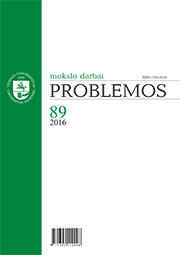JUSLUMO IR ANTJUSLUMO ASIMETRIJA ARVYDO ŠLIOGERIO PATYRIMO SAMPRATOJE
THE ASYMMETRY BETWEEN SENSUALITY AND METASENSUALITY IN ARVYDAS ŠLIOGERIS’ CONCEPTION OF EXPERIENCE
Author(s): Mantautas RuzasSubject(s): Metaphysics, Epistemology, Contemporary Philosophy, Existentialism, Philosophy of Mind, Phenomenology, Hermeneutics
Published by: Vilniaus Universiteto Leidykla
Keywords: Arvydas Šliogeris; Martin Heidegger; experience; ontology; epistemology;
Summary/Abstract: The article analyses Arvydas Šliogeris’ conception of experience and contrasts it with Heidegger’s philosophy. In Šliogeris‘ conception an experienced object is treated differently than in Heidegger’s – the object is not articulated in the plane of immanence and not constituted by the intentional acts of consciousness or signification. In Šliogeris’ philosophy object is treated as a transcendent thing which can be experienced only from the radical dualistic standpoint based on irreducible dichotomy between consciousness and the thing. Šliogeris associates the plane of transcendent things with exterior pure sensuality. In Šliogeris’ understanding, sensual givens are experienced without conditions of the possible givenness and are given prior to the meta-sensual plane of language. Heidegger’s conception of experience, on the contrary, is based on the premise that the plane of language is prior to sensual givens. In Heidegger’s analysis, everyday life-experience fundamentally functions as hermeneutical practice, i.e. as experience which already understands and interprets.
Journal: Problemos
- Issue Year: 2016
- Issue No: 89
- Page Range: 110-118
- Page Count: 9
- Language: Lithuanian

